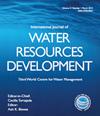重塑水资源管理
IF 2.2
3区 环境科学与生态学
Q3 WATER RESOURCES
International Journal of Water Resources Development
Pub Date : 2023-06-20
DOI:10.1080/07900627.2023.2222989
引用次数: 0
摘要
当人们阅读世界上任何地方的主要国家媒体时,很可能大部分时间都会至少有一篇关于极端干旱和洪水、热浪、野火、海平面上升或气候变化的文章。所有这些问题都以某种方式与水直接相关。此外,在5月31日将“水危机”输入谷歌,将带来5.7亿个结果。尽管近年来对全球和国家水危机的讨论是一个真正的增长行业,甚至可能在未来几年加速,但事实仍然是,世界面临水危机并不是因为这种自然资源的实际稀缺,而是因为几个世纪以来的管理不善。如果水资源得到妥善管理,世界不仅现在有足够的水,而且到2100年也有足够的水量,届时全球人口将比目前更多,经济活动也将大大增加。此外,我们目前拥有必要的知识、技术、管理专业知识和资金,可以更好地管理水资源,避免未来的危机。此外,随着知识和技术在未来几十年的快速发展,水务行业将有更多的方法来更好地管理这一资源。因此,与普遍的悲观观点不同,我们对世界水资源的未来持谨慎乐观的态度。在这篇社论中,我们想分享我们对水管理正在面临和可能在未来几年面临的一些挑战的看法,以及如何解决这些挑战。本文章由计算机程序翻译,如有差异,请以英文原文为准。
Reimagining water management
When one reads any major national media anywhere in the world, it is very likely that there would be at least one article most days on extreme droughts and floods, heatwaves, wildfires, sea level rise, or on climate change. All these issues are directly related to water in one way or another. Furthermore, putting ‘water crisis’ into Google, on 31 May, would have brought 570 million results. While the discussions of global and national water crises have been a real growth industry in recent years and it may likely even accelerate in the coming years, the fact remains the world is not facing a water crisis because of actual physical scarcity of this natural resource but because of its poor management over the centuries. If water is properly managed, the world has enough water not only for now but also for 2100 when the global population will be higher than what it is currently, and economic activities will be much greater. Furthermore, we currently have the necessary knowledge, technology, management expertise and financing to manage water significantly better to avert future crises. Also, as knowledge and technology advance rapidly in the coming decades, the water profession will have many more ways in which to manage this resource immensely better. Thus, unlike the prevailing overwhelming pessimistic view, we are cautiously optimistic about the world’s water future. In this Editorial, we would like to share our views as to some of the challenges water management is facing and likely to face in the coming years, and how these could be resolved.
求助全文
通过发布文献求助,成功后即可免费获取论文全文。
去求助
来源期刊
CiteScore
8.10
自引率
9.70%
发文量
23
审稿时长
1 months
期刊介绍:
International Journal of Water Resources Development is a policy and practice-oriented Journal that covers all aspects of water resources policy, management, development and governance. It is an interdisciplinary journal that focuses on water resources and their economic, financial, social and environmental-related impacts. Contributions which include the interdependences and inter-linkages between the water and the agricultural, energy, industrial and health sectors in both developed and developing countries, both at present and in the future, are welcome.

 求助内容:
求助内容: 应助结果提醒方式:
应助结果提醒方式:


